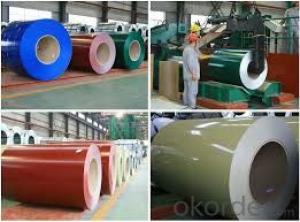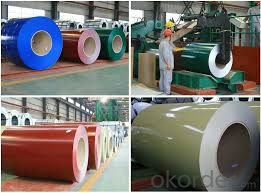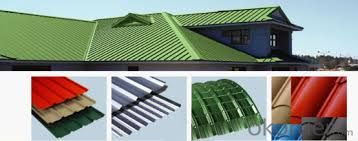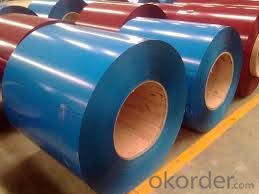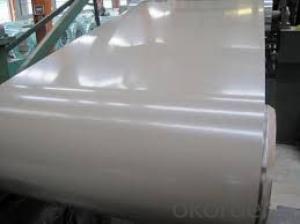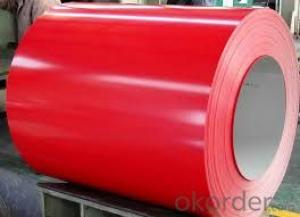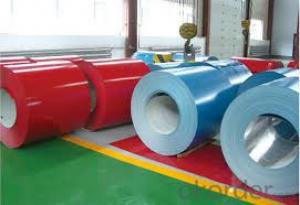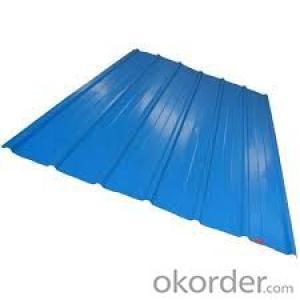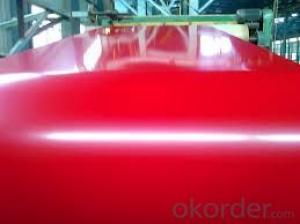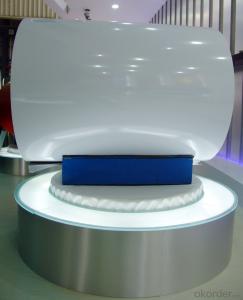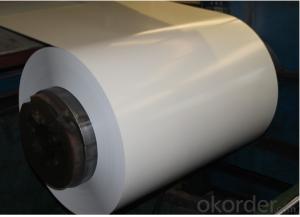Pre-Painted Color Coated Galvanized Steel Coil/China PPGI for Roof Sheet
- Loading Port:
- China main port
- Payment Terms:
- TT OR LC
- Min Order Qty:
- 25 m.t.
- Supply Capability:
- 1000 m.t./month
OKorder Service Pledge
OKorder Financial Service
You Might Also Like
Product Description
Prime CGCC RAL DX51D Z60 Z100 Color Coated Steel/ PPGI/Color Prepainted Galvanized Steel Coil(China)
FOB Price: US $630 - 938 / Ton Get Latest Price
Min. Order Quantity: 15 Ton/Tons
Supply Ability: 5000000 Ton/Tons per year
Port: Qingdao, Tianjin, China
Payment Terms: L/C, T/T, Western Union
Contact Supplier
Company Information
Quick Details
Standard: AISI, ASTM, BS, DIN, GB, JISGrade: SGCC SGCD SGCH DX51D/52D/53DThickness: 0.22-1.0 mm
Place of Origin: Tianjin China (Mainland)Model Number: CGCC CGCL PPGI PPGLType: Steel Coil
Technique: Cold RolledSurface Treatment: CoatedApplication: Container Plate
Special Use: Wear Resistant SteelWidth: 750-1250mmLength: Coil Or Sheet (780-6000 mm ) can be done as your requirements.
Exporting Ability: 500 20ft container/each monthZinc Coating: Z40--Z180g/m2Painting: Front side paint thickness: 15-25μ M (bottom paint + top paint)
Sample: Offer Free Sample For Quality TestContainer Info: One 20ft container can hold 26tons MaxColor: As the RAL color chart
Coil I. D: 508/610 mmCoil Weight: 3.5-8 tons/each coilOther Poducts: Cold rolled, galvanized steel coils
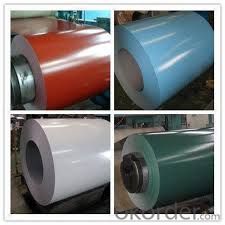
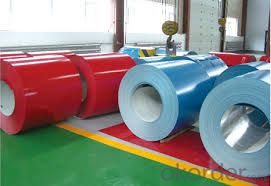
- Q: What are the safety precautions for handling steel coils?
- Some safety precautions for handling steel coils include wearing appropriate personal protective equipment (PPE) such as gloves, safety glasses, and steel-toed boots to protect against potential injuries. It is important to ensure proper lifting techniques are used, utilizing equipment like forklifts or overhead cranes when necessary. Coils should be stored and stacked securely to prevent them from falling or rolling. Regular inspections of coils and equipment should be conducted to identify any potential hazards or damages. Additionally, workers should be trained on safe handling procedures and be aware of the weight and dimensions of the coils they are handling.
- Q: I am doing a project on how revolvers work and what materials they use and would like to know what specific grade of stainless steel they use for the manufacturing of the frame and cylinder?
- *Rifle barrels are usually made from steel alloys called ordinance steel, nickel steel, chrome-molybdenum steel, or stainless steel, depending upon the requirements of the cartridge for which they are chambered. The higher the pressure and velocity of a cartridge (pressure and velocity usually go up together), the faster it will wear out a barrel. To give a satisfactory service life, barrels for high velocity cartridges must me made from tougher and harder steel than barrels for lower pressure cartridges. *The 400 (416) series SS commonly known as ordnance grade , is what barrels are made from . *If you want your barrel to be made from super alloy then it is 718 Inconel ,but a costly affair.
- Q: What are the typical coil thickness options?
- The typical coil thickness options vary depending on the specific application and industry. However, common coil thickness options range from 0.005 inches (0.127 mm) to 0.249 inches (6.32 mm). These options provide a range of flexibility and durability for different purposes, such as in automotive, construction, or electrical industries.
- Q: How are steel coils inspected for width?
- Steel coils are inspected for width using various methods to ensure they meet the required specifications. One common method is to use a caliper gauge, also known as a micrometer, which measures the width of the coil by physically contacting its edges. The operator places the caliper gauge at various points along the width of the coil and records the measurements. This method allows for precise measurements and helps identify any inconsistencies or deviations from the desired width. Another method used for inspecting steel coil width is laser measurement. Laser sensors are positioned on both sides of the coil, and they emit a laser beam that scans across the width of the coil. The sensors detect the distance between the coil's edges and provide accurate width measurements. This non-contact method is highly efficient and can quickly inspect the width of the coil without any physical contact or potential damage. In addition to these methods, some advanced systems use computer vision technology for width inspection. Cameras and image processing software are employed to capture images of the coil's edges. The software analyzes these images and calculates the width based on the detected edges. This method allows for high-speed inspections and can detect any irregularities in the width of the coil. Overall, steel coils are inspected for width using a combination of physical gauges, laser sensors, and computer vision technology. These methods ensure that the coils meet the required width specifications and help maintain quality control in the steel manufacturing process.
- Q: Steel Strings on your guitar or nylons? Why?
- I love steel strings on MY guitar because the brand of strings and the type of guitar I have makes the strings softer on my fingers than other people's Steel Stringed guitars. Nylon sounds weird to me.
- Q: Some stainless steel products are as shiny as chrome. Can all/most stainless steel be polished to a chrome like luster.
- The nickel and chromium content do have some effect on shine. But mostly they effect the corrosive and rust resistance property's of the stainless steel. 300 series stainless steel such as 304e or 316e will not rust like 400 series 416e eventually will. All types of stainless steel can achieve a bright shine. The key is using jewelers rouge and the correct buffing wheel. Avoid scotchbrite if you want shine. It will clean your stainless steel but it will not shine it the way you want. Miketyson26 (certified tig welder)
- Q: How are steel coils used in the manufacturing of drivetrains?
- Steel coils are commonly used in the manufacturing of drivetrains as they provide the necessary strength and durability required for these critical components. The steel coils are typically formed into various shapes, such as gears, shafts, and axles, which are then machined and assembled to create the drivetrain system. These steel components help transfer power from the engine to the wheels, allowing the vehicle to move efficiently and smoothly.
- Q: gigantic navy ships made of steel float, why??
- Believe it or not - A steel boat floats for the exact same reason all boats float. And the very best - easy to understand explanation of this (with pictures) is at the link below.
- Q: So...I'm learning about how steel is made and I'm wondering if there is a more environmentally friendy method. I view it as unfriendly b/c of the oxygen that is injected when the steel is in the blast furnace or electric arc furnace. This oxygen bonds w/ the carbon to produce CO and CO2. THis is necessary to reduce the amount of carbon content to produce harder steels. So what other methods are there that can be used w/o having to end up w/ co and co2? thanks
- From what I understand of it, US steel is better as the steel is more recycled than Canadian, so a lot of that oxygen / CO2 has already taken place compared to working from ore. The second reason US steel is environmentally ahead of Canadian is that US tends to use Electric Arc, while Canadian uses Basic Oxygen, Basic Oxygen uses more energy than electric arc, and I think it also uses more oxygen, but I would suspect that oxygen that it uses is 'waste oxygen' and not converted into Co2 because the Co2 process is limited by the carbon, and steel only has so much carbon.
- Q: any one have an opinion? i've heard steel cut oatmeal is better for you...
- This Site Might Help You. RE: what's the difference between natural rolled oats oatmeal and steel cut oatmeal? any one have an opinion? i've heard steel cut oatmeal is better for you...
Send your message to us
Pre-Painted Color Coated Galvanized Steel Coil/China PPGI for Roof Sheet
- Loading Port:
- China main port
- Payment Terms:
- TT OR LC
- Min Order Qty:
- 25 m.t.
- Supply Capability:
- 1000 m.t./month
OKorder Service Pledge
OKorder Financial Service
Similar products
Hot products
Hot Searches
Related keywords
